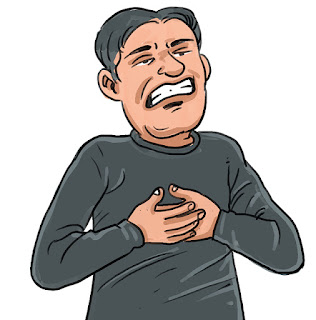Warning Signs Of Heart Attacks
- Get link
- X
- Other Apps

Understanding the early warning signs of a heart attack is crucial for prompt treatment and prevention of serious complications. These signs can vary from person to person, but commonly include chest pain or discomfort, shortness of breath, nausea or vomiting, lightheadedness or dizziness, and pain or discomfort in other areas such as the arm, jaw, neck, back or stomach. It's important to seek medical attention immediately if you experience any of these symptoms as they may indicate a heart attack.
Early intervention can greatly improve outcomes and reduce the risk of further damage to the heart.
Chest pain or pressure is the most common warning sign of a heart attack. The sensation may feel like a squeezing, fullness, or tightness in the chest area that can last for several minutes or come and go. The pain may also spread to other areas such as the arms, neck, jaw, back, or stomach. It is important to note that not all heart attacks present with chest pain and some people may experience only mild discomfort or no symptoms at all.
If you experience any unusual symptoms that persist for more than a few minutes, seek medical attention immediately.
Shortness of breath, nausea, and fatigue are other potential warning signs of a heart attack that should not be ignored. Shortness of breath can occur even during light physical activity or while resting. Nausea may be accompanied by indigestion or vomiting. Fatigue may also be experienced as weakness or lightheadedness. These symptoms can occur in men and women and may indicate an impending heart attack, especially if they are sudden or severe.
If you experience any of these symptoms, seek medical attention immediately.
Recognizing the signs of a silent heart attack is crucial in preventing serious damage to the heart. Unlike a traditional heart attack, a silent heart attack may not cause any noticeable symptoms such as chest pain or shortness of breath. Instead, individuals may experience subtle symptoms such as fatigue, nausea, or jaw pain. These symptoms are often mistaken for other health conditions and can go unnoticed for days or even weeks.
It is important to seek medical attention immediately if any of these warning signs occur to prevent further damage to the heart.
If you experience any warning signs of a heart attack, it is crucial to act quickly. Call emergency services immediately and seek medical attention. Do not attempt to drive yourself to the hospital or wait for the symptoms to pass. It is also recommended that you chew and swallow an aspirin, unless you are allergic or have been advised not to take it by a doctor.
Stay calm and try to remain as still as possible until help arrives. Time is critical in treating a heart attack, so don't delay seeking assistance.
Prevention strategies are key to lowering your risk for heart disease and heart attacks. One of the most important steps is maintaining a healthy lifestyle by eating a balanced diet, exercising regularly, and avoiding smoking. It is also important to manage any underlying health conditions such as high blood pressure, diabetes, and high cholesterol. Regular check-ups with your doctor can help identify any potential issues early on.
Additionally, reducing stress levels through relaxation techniques or therapy can also lower your risk for heart disease and heart attacks.
Early intervention can greatly improve outcomes and reduce the risk of further damage to the heart.
Chest pain or pressure is the most common warning sign of a heart attack. The sensation may feel like a squeezing, fullness, or tightness in the chest area that can last for several minutes or come and go. The pain may also spread to other areas such as the arms, neck, jaw, back, or stomach. It is important to note that not all heart attacks present with chest pain and some people may experience only mild discomfort or no symptoms at all.
If you experience any unusual symptoms that persist for more than a few minutes, seek medical attention immediately.
Shortness of breath, nausea, and fatigue are other potential warning signs of a heart attack that should not be ignored. Shortness of breath can occur even during light physical activity or while resting. Nausea may be accompanied by indigestion or vomiting. Fatigue may also be experienced as weakness or lightheadedness. These symptoms can occur in men and women and may indicate an impending heart attack, especially if they are sudden or severe.
If you experience any of these symptoms, seek medical attention immediately.
Recognizing the signs of a silent heart attack is crucial in preventing serious damage to the heart. Unlike a traditional heart attack, a silent heart attack may not cause any noticeable symptoms such as chest pain or shortness of breath. Instead, individuals may experience subtle symptoms such as fatigue, nausea, or jaw pain. These symptoms are often mistaken for other health conditions and can go unnoticed for days or even weeks.
It is important to seek medical attention immediately if any of these warning signs occur to prevent further damage to the heart.
If you experience any warning signs of a heart attack, it is crucial to act quickly. Call emergency services immediately and seek medical attention. Do not attempt to drive yourself to the hospital or wait for the symptoms to pass. It is also recommended that you chew and swallow an aspirin, unless you are allergic or have been advised not to take it by a doctor.
Stay calm and try to remain as still as possible until help arrives. Time is critical in treating a heart attack, so don't delay seeking assistance.
Prevention strategies are key to lowering your risk for heart disease and heart attacks. One of the most important steps is maintaining a healthy lifestyle by eating a balanced diet, exercising regularly, and avoiding smoking. It is also important to manage any underlying health conditions such as high blood pressure, diabetes, and high cholesterol. Regular check-ups with your doctor can help identify any potential issues early on.
Additionally, reducing stress levels through relaxation techniques or therapy can also lower your risk for heart disease and heart attacks.
- Get link
- X
- Other Apps



Comments
Post a Comment